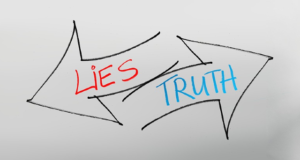Is lying really that bad?
(≈7 min read)

Children are constantly told, growing up, that lying is inherently bad. There are two things I find especially odd about this:
- Whilst being told lying is the worst crime you could ever commit, children are also told to always say “yes” when someone asks “do I look nice?” or say “the food is great,” whenever someone else cooks for them, even if they think otherwise.
- The child is being told to never lie by an adult who more than likely lies even more than the child themselves.
We tell our children to lie in some scenarios whilst simultaneously telling them to never lie at all, hoping one day they’ll be able to work out for themselves when lying is right. But that’s the question: when is lying right? Is lying ever actually helpful? And if so, when is lying permissible? These are some of the questions I’ll be exploring in this article.
Everybody lies
Before we even begin to discuss when lying might be considered right or wrong, the first thing to note, which not a lot of people actually realise, is that we all lie…and a lot. The research on exactly how frequently we lie isn’t entirely consistent, with some pieces of research claiming we lie on average 2-3 times in a ten minute conversation, with others claiming we lie as little as 1.65 times a day.
The problem with research on lying is that accurate results are dependent on people telling the truth about how often they lie. As Dr Gad Saad notes in his article:
“The average number of lies told per day was 1.65. This strikes me as surprisingly low. I have the feeling that many participants were lying about the extent of their lying!”
What every piece of research is in concordance with however is the fact that everybody lies. Sorry to break it to you, but those people you perceive to be the most honest are likely to be much more deceitful than you’d ever know.
But does that make them bad people? Well, not really; in fact there could be an argument to suggest that lying could demonstrate empathy and compassion. The question becomes then: are there circumstances when lying is actually a form of kindness?
Can lying be a form of kindness?
Picture the following scenario: your best friend has spent the last year writing a novel. He hands it to you and asks you what you think. Reading it, you quickly begin contemplating whether you’ve ever in your entire life stumbled upon a worse story. The plot is flawed and the characters’ personalities are completely inconsistent.
The question is: what do you say to your friend? Do you lie and tell him you think it’s great? Or do you tell him the potentially hurtful truth?
Most people would agree that telling your friend straight up that the novel is complete garbage would be kinda wrong and immoral.
I’d argue, however, that simply going up to your friend and saying something along the lines of, “Oh, yeah, your book is great”, may not be the best choice either. Sure, a ‘white lie’ may well be the optimal short term solution, but is it really the optimal long term one?
What a lot of us fail to realise is that there is a distinction between telling the entire truth and telling only the bits that are necessary. You’re not lying if you refrain from telling the bits you think might be hurtful or unnecessary. For example you’re not lying if a stranger comes up to you and asks for your bank details and your response is to simply ignore them.

Saying something like, “overall I think it’s amazing that you’ve written a book and there are parts of it I really enjoyed but I thought that maybe you could have done…to improve…” is, in my eyes, a much better response.
As I’ve mentioned, simply saying “your book is trash,” in isolation is clearly not going to be particularly beneficial. If you’re going to criticise someone, make sure that the criticism you provide is constructive. Knowing you think the book is trash is not going to help them, but knowing why you think the book is trash will.
It’s my experience that people generally respect and appreciate the truth. Therefore, if you’re able to articulate how you think someone could improve in a respectful manner, I’d argue that that’s much better than refraining from saying anything at all, out of fear they might take offence.
At the end of the day, although you might hurt your friend in the short term, your honesty (if sincere and not intentionally hurtful) will be highly valued. Now whenever they write their next novel, instead of turning to all those other friends who told them their previous one was amazing, they’ll turn to you.
Being nice does not have to require lying. As I said before, not providing certain pieces of information you think might be hurtful is not lying. Saying something is great when you don’t think it is however, that is lying. I’d say generally, therefore, it’s always better to try and tell someone the truth.

As always, there are obviously some exceptional circumstances. Would you tell a dying child that you don’t believe in an afterlife if they asked?
Equally, there are also cases where lying increases the odds of you (or the people around you staying safe) – for example if a guy wielding a knife knocked on your door and asked if your sister was home.
Don’t tell the truth in a way that’s intended to hurt
I’ve touched on this in the last section but despite the truth being the optimal solution in the long term, there are also ways to minimise the risk of being overly offensive in the short term.
For example instead of saying to that chef, “Your food was ghastly, I have no clue how you became a chef, and I’m never coming back here again,” which might be your actual thoughts, you could say something like:
“To be honest, I wasn’t that much of a fan, but that might just be me.”
Can you see the difference?
Both statements are completely and utterly the truth but there is a certain way of delivering that truth that is much more respectful.
So when you’re telling the truth, don’t tell the truth in a way that is intended to hurt the person you are dealing with. If you want people to actually respect your opinion, it’s much better to tell the truth in a way that might help someone than to lie to that person just in an effort to be nice to them.
The truth is most people have a ridiculous number of people they can turn to if they’re in need of fake praise or validation. It’s a very rare person who they can turn to and know they’re always going to get an honest opinion.
How to be honest to people who do wrong to you
When dealing with people who have done wrong to us, it’s super easy to get mad, and tell people exactly what we think about them – that they’re evil and manipulative and that we wish they’d disappear.
But telling the full and hurtful truth won’t benefit either of you. It won’t change them. Instead, as mentioned before, it’s (arguably) better to try and deliver critical advice in a respectful manner.
As Marcus Aurelius puts it, when confronted with someone who has done wrong to you:
“Your advice must not be ironic or critical. It should be affectionate, with no hurt feelings, not a lecture or a demonstration to impress others, but the way you would talk to someone by himself irrespective of company.”
How excessive lying can create inescapable webs
Consider the following scenario: a friend of yours asks you whether you’re coming to a party. You’d prefer to relax in bed; you don’t like parties generally and this one specifically has a tonne of people there you don’t really like.
What might you say to your friend to justify your absence? A common response might be something like:
“Oh sorry, I wish I could have come but I’m actually meeting a friend today.”
As opposed to telling the truth or at least a condensed version of it, (e.g. “Thanks for asking but I’m good, I’m not that big a fan of parties and don’t feel like it tonight,”), it’s fairly normal to revert to this flat out lie, an excuse. But is that the right move?
Let’s take a moment to consider the implications of this seemingly tiny, inconsequential fib – that you were meeting a friend.
Firstly, there’s a good chance your friend will have another party. That’ll require you dishing out another excuse. Then your friend might have another. You can’t make excuses forever. If you were to have just told the truth to start with, you wouldn’t have to go through that painful process of devising a realistic excuse each and every time.
Secondly, there’s a good chance that your friend who you turned down the party invitation from might ask you the following day, “how was your meeting with your friend?”
And being forced to lie again, you might say, “good,” and your friend might say, “What did you do? Where did you go?”

And then, on the spot, you’ll have to construct some elaborate story and name a café you had coffee at.
And then perhaps next time when you’re walking past that coffee shop you’ve never actually been in, your friend might ask you what drink you had and whether it was nice. Once again, you’ll be forced to lie.
The cycle continues; this one tiny lie forcing you to lie over and over, just to cover your tracks. Now imagine if you were to lie about ten things in a day. Imagine how many fictional stories would emerge as a consequence. Imagine how many events or supposed things you did you’d have to remember.
Lying is comparable to when you throw a stone into a lake; there’s a small splash and then ripples propagate outwards, growing larger and larger. Every time you lie, you’re forcing yourself to have to remember that lie. If someone questions you, you need to be able to recall that lie accurately. And then when they question you again, you have to remember the lie about that lie.
The problem is your brain physically can’t store all these lies. And so for a serial liar, before they know it, they’re completely enmeshed in this huge web of lies and it’s not long before they’re found out. It’s virtually impossible for someone to remember every lie they’ve ever told.
The easy way to avoid getting into this scenario is simply to tell the truth. That way, no remembering whatsoever is required. You don’t have to remember the truth; you only have to remember lies.
Why you should be truthful about who you really are
As I’ve discussed earlier, a lot of the time, lying is actually a very good short term solution. But it’s the long term consequences that you need to worry about.
Deep lies for example are often the cause of emotional instability. I know the link between honesty and emotional stability might feel tenuous, but when you really consider the implications of lying, it becomes apparent just how negatively it could impact your emotional wellbeing.

Now I’m not talking about lying to your partner about their clothes looking good; I’m talking about a deeper kind of lie – the lie we tell people about who we really are. There’s a tendency for each of us to hold up a mask, a veil in front of our own face and act in ways around other people solely because we want to be perceived in a certain way. It’s human nature to want recognition, praise and respect.
But these desires are in many cases the root of emotional instability.
The more you repress a certain emotion, the deeper it’ll affect you.
Wearing a mask constantly is draining and exhausting and when that mask inevitably falls off, you’ll find you begin to plummet, and fast. Imagine filling up a balloon. The more you hold in those emotions, the more you’re pumping that balloon with air. The problem is, one day the balloon’s going to pop.
Learning to be honest about who you are and being able to express exactly what you genuinely feel to other people is a kind of superpower. You’re not forced to be anything you’re not; no having to conceal anything or repress anything; you’re liberated to be unapologetically you.

There’s also no real room for embarrassment or feelings of inadequacy because if you’re being openly vulnerable to begin with, if you’re already super open about your fear of spiders for example and mock yourself, no one else can really ever hurt you and make you feel embarrassed about that fear.
Embarrassment comes from when you care about what people might think if they found something out about you. If you’ve already voluntarily told them that thing however, there’s nothing you can really be embarrassed about.
Using humour is always a great way to transcend any problem you might be experiencing; making a joke about a problem or fear you have is the ultimate sign that you’ve acknowledged that problem, are comfortable about it and have risen above it. As Seneca said:
“Laugher and a lot of it is the right response to things that drive us to tears”
So you need to be truly honest with yourself; are you prone to lying just so others perceive you in a certain light? Do you convince yourself that you’re doing good, when you know you’re not? Do you ever take time to really consider the true motivations behind your actions, even if those motivations are uncomfortable to deal with?
It’s painful to admit sometimes, but admittance is really the first step to change. Being self-aware and truly honest with who you are is something that society severely undervalues.
The worst person you can ever lie to is not anyone around you, but yourself.








